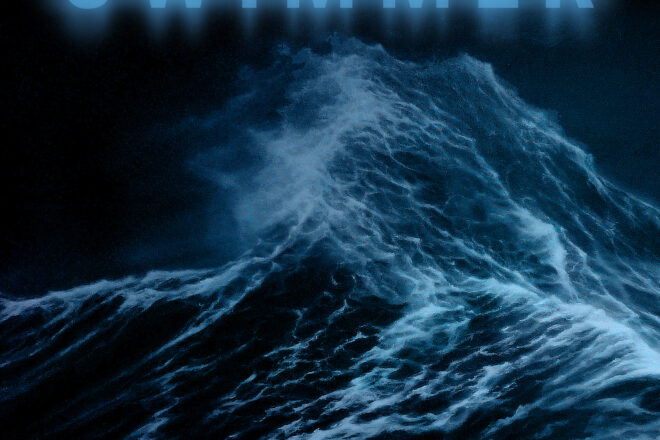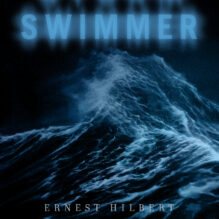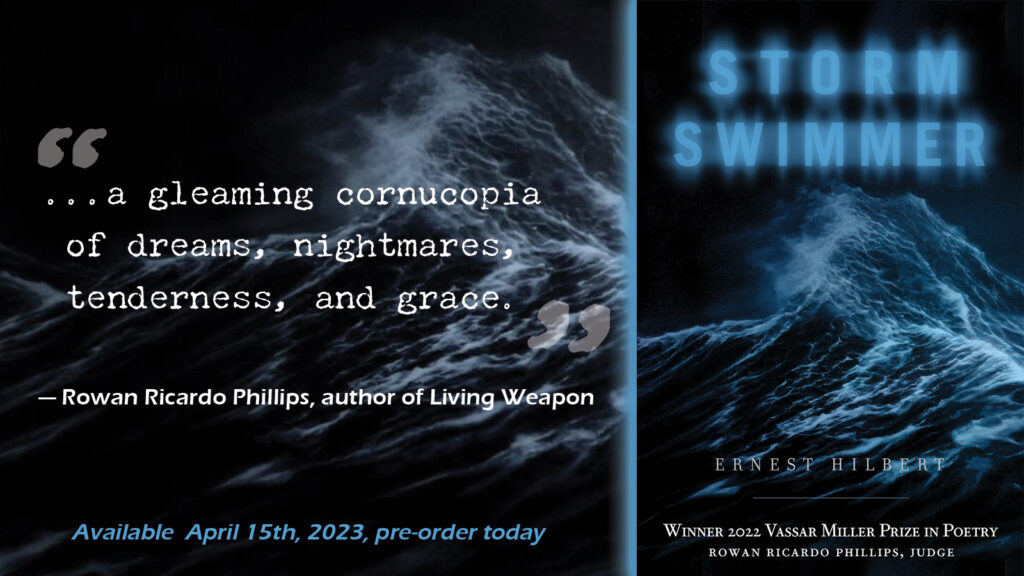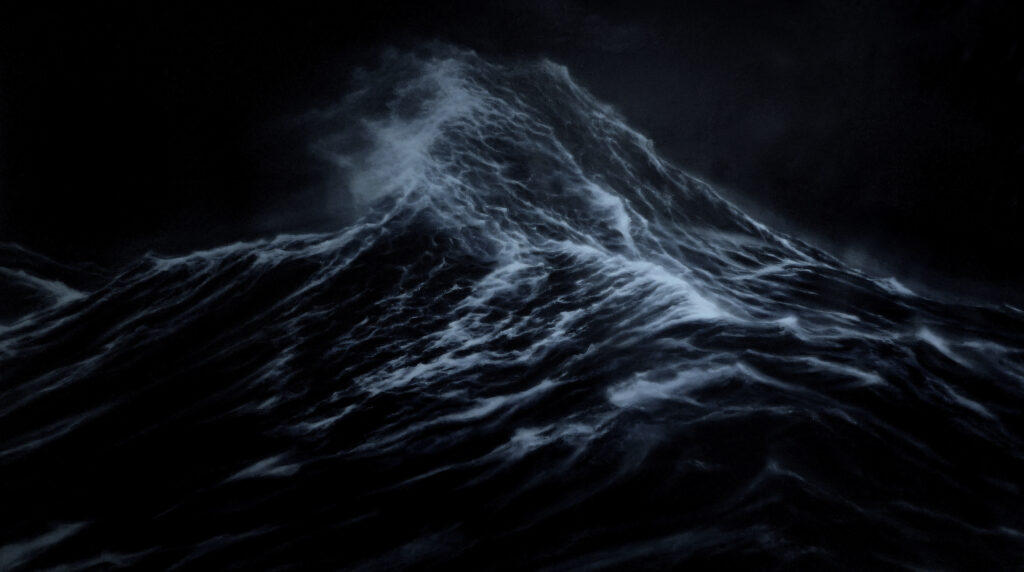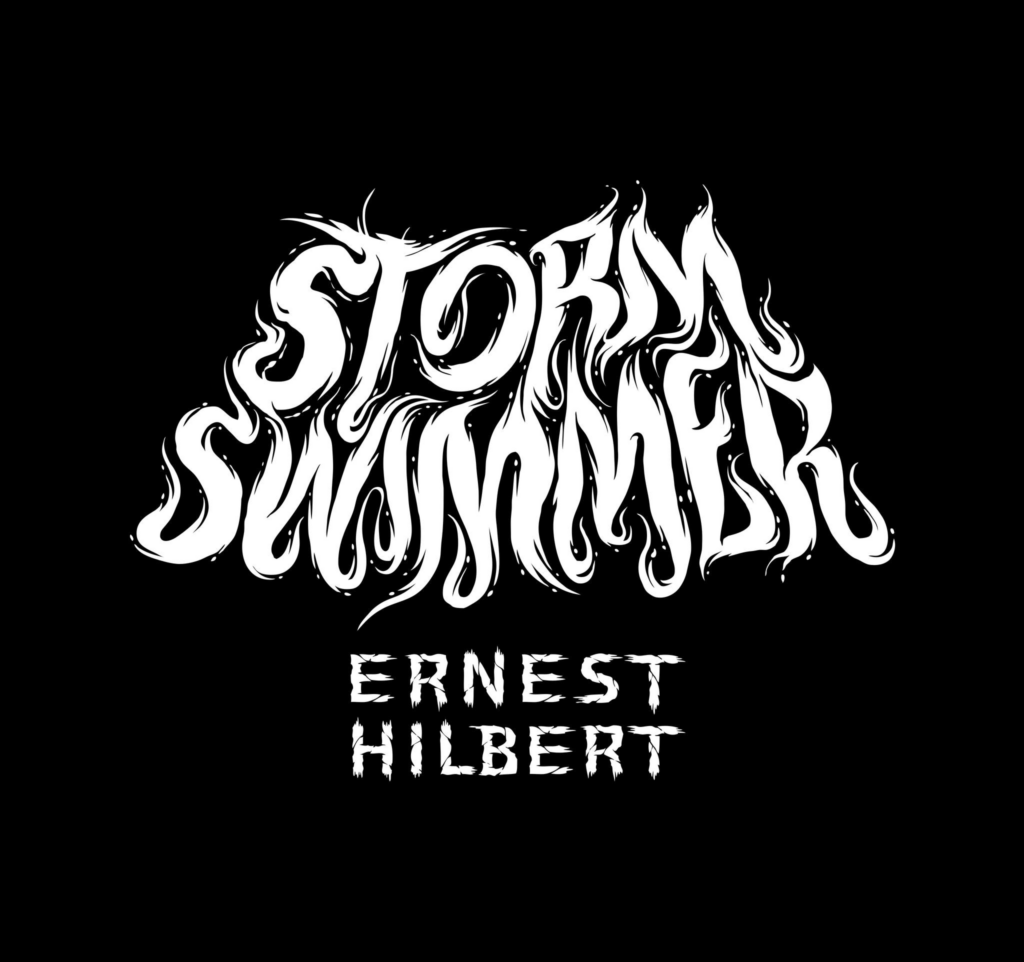“EVERYTHING IN THIS BEAUTIFUL BOOK LIVES”
HILBERT, Ernest. Storm Swimmer. Denton, TX: UNT Press, 2023. Octavo, stiff paper wrappers, 6” by 9.” $14.95. ISBN-13: 9781574418958. E-Book also available for download.
Storm Swimmer, Ernest Hilbert’s fifth collection of poetry, was selected by Rowan Ricardo Phillips as winner of the 2022 Vassar Miller Prize in Poetry. The book was published by UNT Press on April 15th, 2023. Visit University of North Texas Press for review copies and examination copies.
Order from Barnes and Noble, Powell’s, Charter Books, Waterstones (UK), Blackwell’s (UK), Harvard Bookstore, MIT Bookstore, Thrift Books, Midtown Reader, Buffalo Street Books, Skylight Books, The Ivy Bookshop, Palabras Bookstore, Discover Books, Joyride Bookshop, Books on the Square, Head House Books, Sandman Books, Amazon, Amazon UK, Amazon (Belgium), Walmart, Libroworld, Book Culture, Wildman’s Books, Elm Street Books, Amazon Canada, Indigo (Canada), PennCentre (Canada), Halifax Shopping Centre (Canada), Bookshop.org, Book Depository, Bokus (Denmark), Buscalibre (Argentina, Spain, Chile, Colombia, México, Perú), Unimart (Costa Rica), Booktopia (Australia), Fish Pond (New Zealand), Wheelers (New Zealand), Mighty Ape (New Zealand), Takealot (South Africa), Hugendubel (Germany), CeDe (Switzerland), Matfel (Poland), Polska Księgarnia (Poland), Libris (Netherlands), Bruna (Netherlands), Scheltema (Netherlands), Bol (Netherlands), Adr. Heinen (Netherlands), Ceneo (Poland), Adlibris (Sweden), Takealot (South Africa), Thalia (Germany, Austria, and Switzerland), Momox (Germany), Kinokuniya (Japan), Open Trolley Books (Singapore), Prince Books, La Feltrinelli (Italy), Feltrinelli (Italy), Bookswagon (India), and Books-a-Million.
SELECTIONS FROM THE COLLECTION
Ernest Hilbert’s fifth collection, Storm Swimmer, electrifies readers with an array of astonishing scenes, all captured in exquisitely imagined lines. Tender poems of fatherhood weigh against unsettling explorations of natural dangers and intimations of bodily harm. In poems that celebrate survival and renewal, Hilbert summons the ageless conflict between human affection and the passing of time, recognizing that all we love must eventually disappear. From porn sets to seedy gun ranges and heavy metal tribute nights in crumbling theaters, Hilbert’s eye roves over the desolation and beauty of contemporary America, all the while feeling the irresistible pull of water—what Melville called “the ungraspable phantom of life.” His poems return again and again to rivers, lakes, and the sea, there to find “a universe that loves the dark,” one that “bears you up as if you had no weight.” Critics have hailed Hilbert’s poems as “original and essential,” “haunted by loss,” “brutal yet beautiful,” defined by “pleasure, clarity, and discipline,” “tough-minded and precise,” “elegant and athletic,” and “human and moving.” Continuing the tradition, Storm Swimmer is a book of terrific assurance and range, a must for any lover of modern American poetry.
Rowan Ricardo Phillips, who selected the collection as winner of the Vassar Miller Prize in Poetry, writes “Storm Swimmer is a gleaming cornucopia of dreams, nightmares, tenderness, and grace . . . . a rare book, both willing and able to capture the wide and relentless range of the human condition in its varying lights and shadows, and in settings spanning the mundane, the tawdry, and the sublime.” Eduardo Corral writes “toggling between the natural world and the relentless spectacle of contemporary life, acutely aware of the passage of time, Ernest Hilbert’s poems are marvelously built, resonant.” Dora Malech writes that it is “a book of light and darkness enacted on scales personal (particular and intimate in its rendering of the bonds of fatherhood) and sweeping (societal, environmental)—often simultaneously.” Karl Kirchwey remarks on the books “verbal and formal resourcefulness of this collection.” Dave Mason calls it Hilbert’s “strongest book so far, urgent and real.”
The poems in the collection first appeared in 32 Poems, Asheville Poetry Review, Bennington Review, Bowery Gothic, The Dark Horse, Cassandra Voices, Edinburgh Review, Fruita Pulp, Hawk & Whippoorwill, Hopkins Review, Hudson Review, Literary Matters (Association of Literary Scholars, Critics, and Writers), Measure Review, Modern Age, The Moth, The New Criterion, The North American Anglican, ONE ART: A Journal of Poetry, Per Contra, Philadelphia Stories, Raintown Review, Red Fez, Seneca Review (50th-Anniversary “On Anxiety” Edition), Smartish Pace, The Spectator, THINK: A Journal of Poetry, Fiction, and Essays, and Trinity House Review.
Ernest Hilbert’s Storm Swimmer is a gleaming cornucopia of dreams, nightmares, tenderness, and grace. In Hilbert we encounter the poet as allegorical realist: a seer who has “known beauty almost impossible / To believe, nearly always lost amid / All the usual distractions.” This is a rare book, both willing and able to capture the wide and relentless range of the human condition in its varying lights and shadows, and in settings spanning the mundane, the tawdry, and the sublime. Storm Swimmer is a book of great feeling and of great technical skill. Everything in it is sacrificed for poetry, which is why everything in this beautiful book lives. – Rowan Ricardo Phillips, author of Living Weapon
I’m deeply moved by Ernest Hilbert’s new collection—his fifth—called Storm Swimmer. That title captures the harrowing action of this book perfectly. In these poems, the joys of fatherhood are hounded by the certainty of death, the undeniable delicacy of human life set against the beautiful chaos of nature. But ultimately it’s not the shadow of despair that colors these pieces; it’s the flame of his resistance. “I know we’re dust,” he writes, “and stardust too, but more.” – Ron Charles, Washington Post Book Club
In Storm Swimmer, fatherhood is neither one-dimensional nor short-sighted; instead, fatherhood is a nexus, rigged with grace and curiosity—an enduring gift for a son and for readers. Toggling between the natural world and the relentless spectacle of contemporary life, acutely aware of the passage of time, Ernest Hilbert’s poems are marvelously built, resonant. – Eduardo C. Corral, author of Guillotine: Poems
Ernest Hilbert’s Storm Swimmer is a book of light and darkness enacted on scales personal (particular and intimate in its rendering of the bonds of fatherhood) and sweeping (societal, environmental)—often simultaneously. Throughout, the ocean’s push and pull is literal—littoral—and figurative—metaphorical, yes, but also “representing forms that are recognizably derived from life”—all definitional italics mine, of course, though the emphasis is all Hilbert’s, a patterning of attentive sound, sight, and specificity that calls to mind Gerard Manley Hopkins’s instress, inscape. While the sublime of the natural world carries its own beauty and terror in Storm Swimmer, the booty and error of the Anthropocene, freighted with consumer stuff and consuming violence, pulls the reader in (and under) as well. As the book tips past its midpoint, we see ourselves in the storm (the repetition of “We’ve never seen a storm like this before” in “Visitation”); we see ourself in the oceanic depths (activated in “Range” by a gun’s report “Surging on the seafloor of my skull”). In Hilbert’s poems, the internal and external blur, while the language lights a way forward through the fog. – Dora Malech, author of Flourish
From the outset these are poems of mood [Storm Swimmer], built on physical sensation. Nature, lovely or harsh, is set at times next to the violence of things commercial and pop-culture derived. Interestingly, in this book Hilbert doesn’t use the trademark “Hilbertian sonnet,” where rhymes come in tercets, cutting across the foursquare sonnet shape. Instead, he’s making new moves: many other invented stanza forms, in mix-and-match line lengths and rhyme schemes. He’s also still fond of mixing pop culture with high, heavy metal with Homer and Mozart, still the “hard drinker and high thinker” of Adam Kirsch’s phrase. – The Hopkins Review
Just as all life once sprang from the sea, so too do the subjects and strengths of these poems. The work of an experienced poet approaching the height of his powers, Storm Swimmer truly is a collection—to modify a phrase from Norman Maclean—both haunted and nurtured by waters. – The Spectator
Ernest Hilbert’s ambitious book Storm Swimmer—it includes epigraphs in Greek from Homer and Apollonius of Rhodes—is a meditation on fatherhood and on the human legacy bequeathed to a young son, culminating in a poem appropriately indebted to Coleridge’s “Frost at Midnight.” But this tender domesticity also achieves a pelagic reach, as the collection begins and ends with ocean swimming. The fact that one of its maritime settings is Corson’s Inlet on the New Jersey shore, where poet A. R. Ammons revolutionized the relation between thought and poetic line in a way that sparked Projectivism, is indicative too of the verbal and formal resourcefulness of this collection. And its cultural range is no less wide—from Mozart’s K. 265 or Fauré’s Requiem to a Heavy Metal tribute night. – Karl Kirchwey, author of The Engrafted Word
Ernest Hilbert’s Vassar Miller Prize-winning Storm Swimmer explores the quieter rewards of fatherhood and memory—the sort of humane vision that online life threatens to eclipse. In this, Hilbert’s fifth book, storms (including interior ones) swirl and rage, potent in action or as lurking threat. Ernest Hilbert’s Storm Swimmer, so remarkable for its style and polish, is most impressive for its kindly, meditative depths. – Literary Matters
Ernest Hilbert has always written from the ragged edge between tradition and the present moment, and now he goes for a deeper immersion, a swimmer in life, aware of its most desperate and beautiful currents. Here we have the consolations of family life, but also the desolation and waste of pornography and the art world—even rhymed couplets on a semi-automatic pistol. The sea has taught him to ride out the detritus of existence, to see it but not be consumed by it, and his forms give spine to his vision. Storm Swimmer is his strongest book so far, urgent and real. – David Mason, author of Pacific Light
In Hilbert’s latest book, Storm Swimmer, the scale of the vision of each composition evokes a
sense of overawing vastness one doesn’t always find in American poetry. Part of this must come from Hilbert’s virtuosic innovations on the formal English poetic tradition, which is to say the sense of history and family tree—especially the influences of Auden, Hopkins, as well as Americans Robert Lowell and A.R. Ammons—it brings to bear on its contemporary subjects. But there’s more than that, something plainly if
sometimes coyly American, a Keanu Reeves-worthy sense of “whoa” . . . . – Hugh Sheehy, author of Design Flaw: Stories
Cover art, “La Furie” by Paris-based Chilean painter Franco Salas Borquez (2016, 65 × 122 in), courtesy of the artist and M Galerie Boston, from a private collection. The book cover title is set in Trade Gothic Bold; the author’s name in Filosofia OT regular; and the prize citation in Corundum Text Book SC. The book’s logo for use t-shirts, stickers, and magnets hand-drawn by heavy metal logo designer ModBlackmoon (Irina Karotkaya).
“Riddle Me” was written specifically as NFT (nonfungible token) art, listed for sale on OpenSea, a peer-to-peer marketplace for rare digital items and crypto collectibles housed at the Hunter College MFA program in New York City. It was posted for sale on March 18, 2021, and sold to a private collector on July 2 the same year. The poem “Last Rites” appeared as a limited-edition letterpress broadside, issued by Tollund Press of Essex County, Massachusetts, in summer 2021 in an edition of twenty-four numbered copies, signed (four copies hors de commerce), with artwork provided by Ian, the author’s son. The poem “Pelagic” appeared as a limited-edition letterpress broadside from Tollund Press in summer 2022 in an edition of sixty numbered copies, six signed and sealed in bottles, three to be deposited into the gulf stream. “Appeal” was selected as a Laureates’ Choice winner in the 2021 Maria W. Faust Sonnet Contest, Great River Shakespeare Festival.
The epigram from Giacomo Carissimi (1605–1674) can be translated as “my heart is a sea of tears,” a line from the duetto “Partenza dalla sua Donna.” The poem “Remains” does not refer to any real place or history. Lancelot Andrewes described “solsitio brumali” as “the very dead of winter” or the winter solstice. The Latin term “spolia opima” translates as “rich spoils” and refers to the trophies a Roman general stripped from the corpse of an enemy slain in single combat. “Stercus Diaboli” is “the Devil’s shit.” William H. Race translates the epigraph to this book, from the Argonautica, as:
And likewise the other heroes boarded and took their seats in order and grasped the oars in their hands. Argus loosed for them the stern cables from under the sea-washed rock. Then they began striking the water mightily with their long oars. At evening, on Orpheus’ instructions, they put in at the island of Electra, Atlas’ daughter, so that by learning secret rites through gentle initiations they might sail more safely over the chilling sea. Of these things, however, I shall speak no further, but bid farewell to the island itself and to the local divinities, to whom belong those mysteries of which I am forbidden to sing.”
The epigraph to chapter seven is from book five of The Odyssey, translated by Samuel Butler as: “Thereon he floated about for two nights and two days in the water, with a heavy swell on the sea and death staring him in the face; but when the third day broke, the wind fell and there was a dead calm without so much as a breath of air stirring.”
A series of 74 tee shirts in sizes S to XXL on Tultex 202 100% ringspun cotton were screen-printed by master printer Brian Potash at Devilfish Ink in the Fishtown neighborhood of Philadelphia.
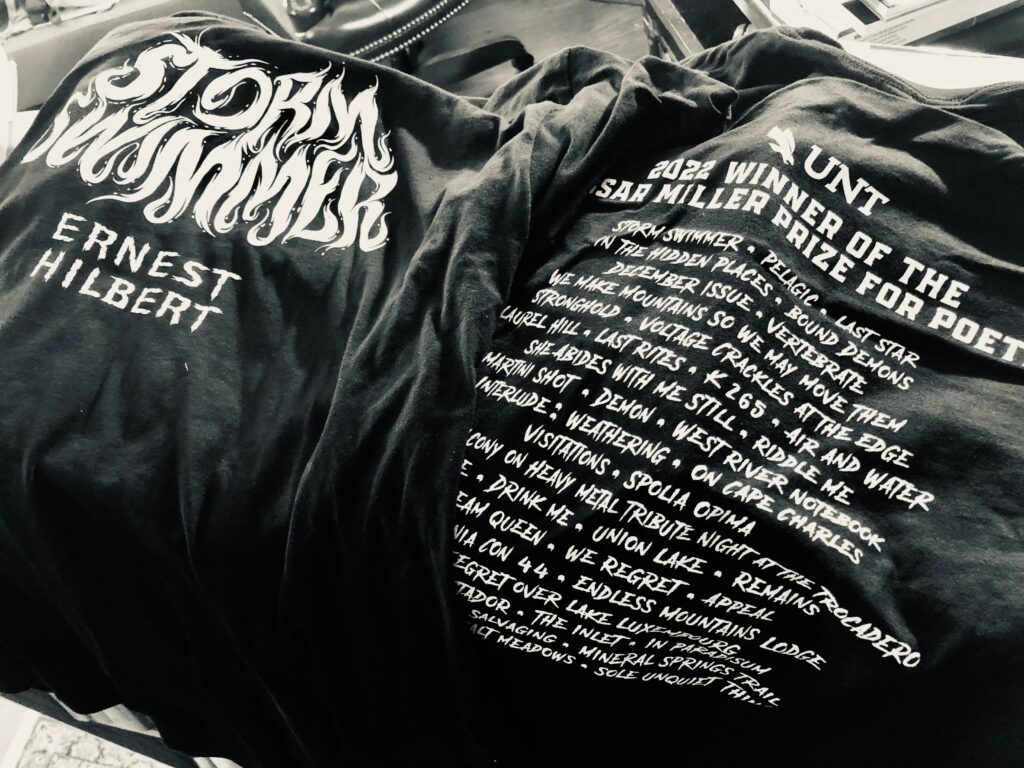

As [some] poems [in Storm Swimmer] look out from our small, human perspective, others respond with a feature of the mind we’ve only briefly noted here: it’s ability to perceive itself, sometimes as if from—or through the metaphorical lens of—the future. – North of Oxford

